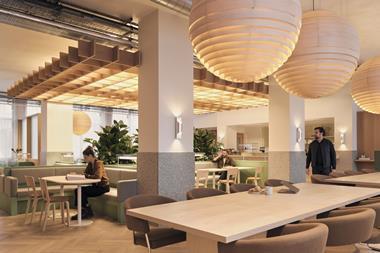The UK’s flexible workspace sector has had an exciting year. Growth has continued at double-digit rates, new operators as well as new entrants such as financial institutions and funds have emerged all with sharply different offers.

All this has combined to significantly reshape the flexible office market but we expect even more change to come - here are five predictions for 2019
- Space as a service will go mainstream
The concept of space as a service, which both flexible workspace and long term office lettings can form part of is becoming a mainstream concept for property owners. Tenant demand is driving this with the desire for office space to no longer just be a static entity but to provide a range of products and services and environment on all-inclusive basis. With regard to the flexible element of their space as a service offer, property owners recognise that flexible workspace is one of the best ways to attract tenants to their buildings and ‘incubate’ them for future growth. Also, they realise that if they can keep their offer in step with the evolving needs of their corporate clients then they will keep their tenants in place for longer. One way they are addressing this is the use of multi-functional buildings, containing a mix of traditional leases, flexible workspace and space as a service products. This range of income streams will enhance the desirability and the long term investment value as well as future proofing the building - Range of products will continue to rise
The arrival of a host of new operators and entrants in the market has significantly increased the variety of products and offers as new and existing players try and differentiate themselves. For instance, IWG, which originally only had one brand, Regus, is now providing a stable of six flexible office brands across its platform. CBRE, The Crown Estate, British Land, LandSec and Legal & General are all launching very different flexible brands. A key battleground will be hospitality, whether in regard to services provided or amenities offered. Flexible workspaces will compete to cater for individual tastes and choice of working environments, aiming to provide individuals with the kind of personal space and lifestyle benefits that dovetail with the way they want to work and live their lives. - M&A activity will accelerate
M&A activity is set to accelerate further with consolidation of existing operators and acquisitions by new entrants being the key drivers. Inter-operator deals have dominated, such as Regus’ acquisition of Basepoint Business Centres, Moorgarth’s acquisition of London serviced office provider Ventia, Newable’s acquisition of Citibase and i2 Office’s acquisition of Landmark.

More recently outside institutions’ acquisition of operators has gathered pace. Blackstone’s acquisition of a majority stake in The Office Group was the first real sign of this and this was followed by Carlyle’s £150m investment in Uncommon, while earlier this year, RDI REIT bought a controlling stake Office Space in Town’s London portfolio. Most recently Asian family office Cevlam Management acquired London Executive Offices for £475m. Over the coming year we are likely to see this trend continue and the level of inter-operator deals, at least, by value, potentially matched by external players buying into the sector. - An accepted market wide valuation could be adopted
Flexible offices have begun to emerge as a separate investable asset class for institutions. What will accelerate this is the adoption of a market accepted valuation. The RICS is known to be working on a white paper for surveyors on valuations. This is expected to broadly follow a formula that takes into account the unique nature of the service income offered by flexible workspaces. If a market accepted valuation can be agreed flexible workspaces could well take their place alongside such sectors as hotels and student accommodation as a separate asset class and a core part of institutional portfolios. - Use of joint venture management agreements will increase
The increasing trend for building owners to enter the flexible office market via joint venture agreements will intensify. These agreement can be best described as the outsourcing by a property owner of the sales/marketing and ultimate revenue generation of their space to a flexible workspace operator under the terms of an operating agreement. This provides the building owner with the confidence that the space will be run professionally by experts while also ensuring they get a portion of the upside. They can provide returns in excess of ERV and are a lower risk than directly investing in a flexible workspace operator or running their own operation.
Will Kinnear, director, GKRE






























No comments yet